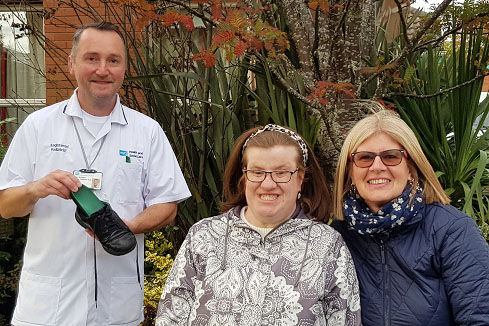
How I got into the role
I graduated from university with a degree in podiatry and immediately started work in 1995. Having worked in community podiatry for five years, I specialised in learning disabilities – a career which I have enjoyed for almost 20 years.
Working with people with learning disabilities is quite different and requires working with multidisciplinary teams.
What I do
I work in a specialist learning disability hospital and the team includes social workers, support workers, speech and language therapists, behavioural therapists, sensory occupational therapists, and consultant psychiatrists and psychologists.
The team approach gives added value for patients who may otherwise have little or no voice – those with limited ability to make informed decisions or choices about their healthcare. I provide a podiatry foot health and screening service, which involves planning and connecting with patients and their families/carers. I assess and prescribe specialist footwear and orthotics.
One thing I have learned is that each person must be treated as an individual, due to various conditions, spectrums, and layers of various disabilities impacting and affecting the family unit. This includes sensory, physical, and learning disabilities.
My relationship, understanding, and rapport are vital to implementing any treatment.
Every patient is different, and time is allowed (reasonable adjustments) for their assessment and participation. There is in-depth consideration of sensory and communication needs in advance for planning effective treatment options.
I have been fortunate to support people voluntarily at the special Olympics, which has allowed me to bring back best podiatry practice and learning into my NHS role. This has been invaluable to me and given me confidence to implement effective support and treatment.
The best bits
I love the positive feedback from patients and families where my interventions have yielded significant improvements or resolution. Even for the most challenging patients, the respect and increased awareness – for each other within the team and towards one patient outcome – cannot be underestimated. The thank-you cards and stories are great, but meeting families who now care for a pain-free, more confident, and mobile individual is the best feeling.
The work is truly humbling, and to be honest it is not for everyone, but if you are relatively tough, empathetic, adaptable, and have patience, you could grow to love the job as I have. Where you are willing to be helped, you will learn to change and make a difference and you will feel valued in this very specialised career. Good luck!